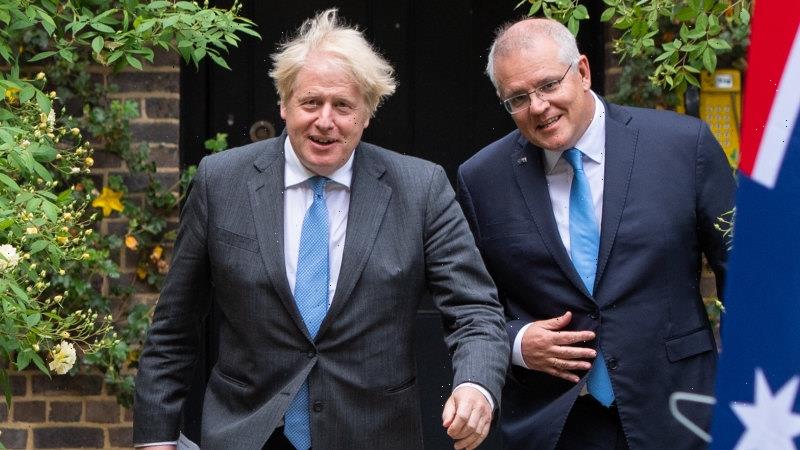More than most international agreements, those focused on trade often reflect the broader politics at play. Australia’s new trade agreement with Britain very much fits that bill.
Prime ministers Boris Johnson and Scott Morrison announced the new deal after negotiating the final obstacles over a dinner of Welsh lamb and Scottish salmon. While the broader framework of the agreement has been made public, the small print will be fleshed out over coming weeks before it is put before the respective parliaments to get the green light.
The big-ticket items include an increase in quotas and a lowering of tariffs for Australia’s agricultural exports, most notably meat, and for Britain a cut in tariffs on items including pharmaceuticals, cars and whisky. British backpackers also won out with the scrapping of the need to work on a farm as a requirement to gain an extension of their holiday visas.
In dollar terms, it hardly signals the return to the heyday of colonial-era trade between the two nations; Britain’s ties with the European Union and Australia’s links to its Asian neighbours both dwarf any financial benefit this new deal may bring. But it does offer both countries greater access to each other’s markets and a political win.
For Mr Johnson, this is the first trade agreement he has signed since the Brexit treaty was finalised at the end of last year, giving him ballast to support his assurances that Britain could thrive as a stand-alone nation. Mr Johnson also sees it as a possible stepping stone to gaining access to much larger markets in our region through such trade agreements as the Trans-Pacific Partnership, which includes Australia, Canada, Japan, Mexico, New Zealand, Singapore and Vietnam. For Mr Morrison, it may not have the same national significance, but it does give him a tangible outcome from his time in Europe and a way to promote his credentials in accelerating Australia’s economic recovery.
But it has come at a cost. In Britain, there has been considerable concern in conservative regional areas over allowing more Australian food into the country to compete with that of local producers. And Australia has had to announce a proposal to grant new agriculture visas with 10 South-East Asian countries to make up for the British backpackers who will no longer be required to work on farms.
At a broader geopolitical level, with the World Trade Organisation stymied by disputes between China and America, a web of nation-to-nation agreements is having to become the (imperfect) mechanisms by which international trade is expanded.
Despite these concerns, world trade is expected to rebound this year by 8 per cent, after it contracted by just over 5 per cent last year. And for a country such as Australia, with our enormous natural resources, exports have, for a long time, been one of the pillars of our prosperity.
Australia is now learning tough lessons about relying too heavily on one nation for its trade revenue. China has shown its willingness to weaponise tariffs to punish Canberra for what Beijing sees as policies and views that are too critical of the communist state.
Australia’s new trade deal with Britain will not mitigate that alone. But it is a welcome return to stronger ties between two nations that have much shared history, and a step in the right direction towards expanding our access to a broader range of markets.
The Morning Edition newsletter is our guide to the day’s most important and interesting stories, analysis and insights. Sign up here.
Most Viewed in World
From our partners
Source: Read Full Article
